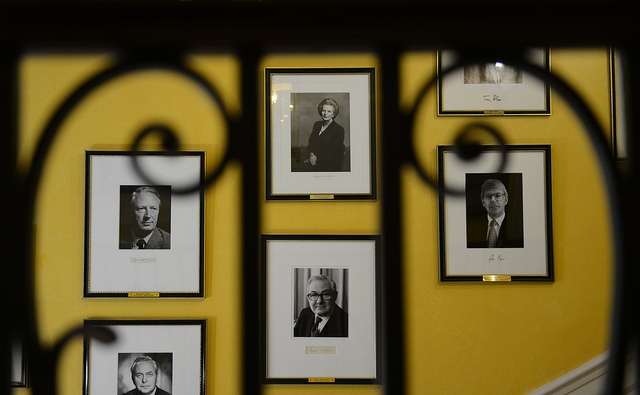Why would anyone want to be Prime Minister?
The challenges are awesome, if not terrifying, for whoever wins the Conservative leadership. Following the vote in favour of Brexit, Cameron’s successor will take control of a divided party, a divided country and significant forces pulling the UK apart. In this light, Ben Worthy considers what motivates those who aspire to be Prime Minister.

Credit: Number 10 Crown Copyright
Being Prime Minister is, even at the best of times, rather tough. For the all of the £143,462 a year and free house (in a lovely central London location) it is a difficult and demanding job.
The next Prime Minister’s in-tray is looking particularly problematic. Whoever leads the UK will have to somehow head a divided party, run a divided country and confront the new forces pulling the UK apart, from the SNP’s referendum manoeuvres in Scotland to the borderless uncertainty of Northern Ireland. This is without mentioning the two years of negotiations with 27 rather upset EU member states.
Why, you may well ask, would anyone want to be Prime Minister now? Why are the runners and riders in the Tory party frantically backstabbing and front-stabbing in a Macbeth-style incarnadine orgy? Why is everyone not doing what we can now term a ‘Boris Johnson’ and running from their responsibilities?
Here’s three reasons why people want to be PM-but each comes with a downside.
1. Because they think they’d be good at it (‘I Should Not fail’)
Many candidates want to be PM because they think they can do it and do it well. They believe only they have the abilities, outlook and temperament to be in control events. Churchill wrote that in the summer of 1940 he knew, as he stepped over the threshold of the famous black door, ‘a good deal about it all, I was sure I should not fail’.
Sometimes they also think that because they have done other jobs well they may be effective leaders-though the evidence for this is not convincing. Gordon Brown was a long serving Chancellor, Eden a (very) long serving Foreign Secretary and John Major did a bit of both. All went on to fail pretty spectacularly in Downing Street.
The problem is that being Prime Minister ruthlessly reveals whether you are truly good at or not. Even though you are still technically only ‘first among equals’ the office of PM is fundamentally different in its exposure from other great offices of state. A Chancellor can, to an extent, duck and hide from the media. A PM cannot. Whoever heads the Brexit government will find out, very quickly, whether they have the skills. And they will have nowhere to hide.
2. Because they want to ‘Change Things’ and ‘Make a Difference’ (‘Walking with Destiny’)
Those who wish to be Prime Minister often speak of changing things and making a difference, though the desire normally precedes the detail. Thatcher and Blair arrived in power intending to modernise the country. Both of them took some time to find out what this all meant and there was a large element, even for Thatcher, of making-it-up-as-you-go-along. Only perhaps Edward Heath changed things at a stroke when he took the UK into the then EEC.
Some Prime Ministers never even had a plan and never made a difference. Despite ten years of plotting, there was no real Brownism. Similarly Wilsonism amounted to very little while Majorism was nothing more than paraphrased George Orwell quotes and a cone hotline.
Any leader that takes Britain out of the EU would indeed walk with destiny and change things to an extraordinary degree. At least for the post Brexit PM the mission is clear (ish) –to leave the EU (ish). Exactly how this is to be done is extraordinarily complex and very, very fuzzy. Leaving would be as time consuming and attention sapping as Northern Ireland or reversing national decline was for a succession of past leaders. The lurking danger is what other change leaving would bring. Will it trigger the break-up of Britain? Would any leader (especially a Conservative) want to be the Prime Minister that finally, after 300 years, dis-united the UK?
3. Because of their ego
Possibly the least noble but most important motive for being PM is ego. The only real immortality, as Machivelli argued, is ‘lasting fame after your death’. In Downing Street, the photos of your illustrious predecessors gaze at you each time you walk up the stairs. Being Prime Minister instantly makes you a true historical figure, inhabiting an office of weather-makers, part of a lineage with Winston Churchill and Margaret Thatcher. That’s an ego boost.
Few politicians can truly avoid the desire to be top. The hand of history, international prestige, the trappings and power are all almost irresistible (not to mention the gifts and foreign travel). Churchill, for all his walking with destiny, was deeply ambitious and egotistical. Lloyd George, no slouch in the ego stakes, said of Winston he ‘would make a drum of out of the skin of his own mother in order to sound his own praises’. So it is with others, as an innate belief in yourself is what gets you there. However, ego destroys as well as creates. It can easily give way to hubris, unwarranted certainty and inflexibility.
Whoever enters Number 10 brimming with confidence needs to look closely at those other faces on the stairwell. From Eden to Brown, leaders attracted by the office found that their supposed abilities and plans turned to dust. Even worse are the reputations of Prime Ministers like Neville Chamberlain (and now David Cameron) who were simply overwhelmed and whose names are synonymous with failure. For every ‘winner’ like Attlee or Thatcher on the wall there are two or three losers who were, as Clement Attlee said, simply ‘not up to it’. Coming bottom of this list is not good for the ego.
Being PM
It is, perhaps all about context. In some situations ego, duty, desire and ability fuse and work together well. Churchill, at least in the summer of 1940, had probably the worst welcome to office possible. The Low Countries were invaded by the German army the very morning he became PM, and the British Empire and its allies (note Empire, not Britain alone) were left facing grave peril. However, Churchill spoke of how
I felt as if I were walking with destiny, and that all my past life had been but a preparation for this hour and for this trial…I was conscious of a profound sense of relief. At last I had the authority to give directions over the whole scene.
How will it be for the new Prime Minister? Power, as Robert Caro puts it, reveals. The challenges are awesome, if not terrifying, for whoever wins the Conservative leadership. Their place in history is secured, though whether as a dazzling success or terrible failure is for them to determine. The first few months of our new PM will tell us very quickly if they are walking with destiny or simply tripping over their own ego.
__
Note: This post represents the views of the authors and not those of Democratic Audit UK or the LSE. Please read our comments policy before posting.
__
 Ben Worthy is Lecturer in Politics at Birkbeck College, University of London.
Ben Worthy is Lecturer in Politics at Birkbeck College, University of London.





 Democratic Audit's core funding is provided by the Joseph Rowntree Charitable Trust. Additional funding is provided by the London School of Economics.
Democratic Audit's core funding is provided by the Joseph Rowntree Charitable Trust. Additional funding is provided by the London School of Economics.
Why would anyone want to be Prime Minister? https://t.co/2B7cDZfACH
Why would anyone want to be Prime Minister? https://t.co/E6S3FGj5lR
https://t.co/2fR22ppCTR
Why would anyone want to be Prime Minister? https://t.co/tEUqoN4oGG
Why would anyone want to be Prime Minister? https://t.co/R7kdHJWrlP
Why would anyone want to be Prime Minister? https://t.co/qRybgVgrlB https://t.co/EIqdvzZGqg
Hilarious: “Why is everyone not doing what we can now term a ‘#BorisJohnson’ & running from their responsibilities?” https://t.co/kICxzIQ3Jv
Why would anyone want to be Prime Minister? Ben Worthy considers what motivates those who aspire to be PM: https://t.co/8wXIdW4YJx
Why would anyone want to be Prime Minister? https://t.co/agCWHEEqcX https://t.co/GttjfafU5Y